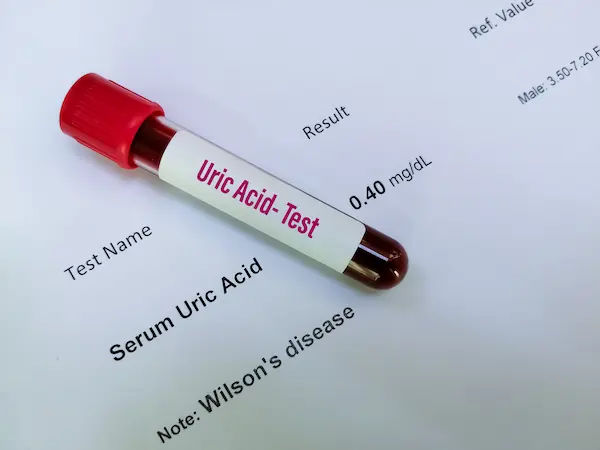Joint Pains in School Children: Why Uric Acid Test Isn’t Just for Adults
Joint pain in children isn't always "growing pains." Discover why the uric acid test, often overlooked in kids, can be a crucial tool for diagnosing conditions like juvenile gout and other underlying issues.

Written by Dr. Rohinipriyanka Pondugula
Reviewed by Dr. D Bhanu Prakash MBBS, AFIH, Advanced certificate in critical care medicine, Fellowship in critical care medicine
Last updated on 10th Sep, 2025

When you hear about uric acid and conditions like gout, you probably think of adults, perhaps older men, or those with certain lifestyle habits. It's a common belief that joint pains linked to uric acid are strictly an "adult problem." However, this isn't always true. While less common, high uric acid levels can affect children too, sometimes leading to unexplained joint pains that can be easily overlooked or misdiagnosed.
For parents of school-aged children experiencing persistent or puzzling joint discomfort, it's important to challenge this common myth. A uric acid test for kids might not be the first thing that comes to mind, but it can be a crucial step in understanding and addressing their symptoms.
What is Uric Acid?
Uric acid is a natural waste product that forms in your body when it breaks down substances called purines. Purines are found in every cell of your body and in many foods and drinks we consume. Normally, your kidneys filter out most of the uric acid from your blood, and it leaves your body through your urine.
In healthy amounts, uric acid acts as an antioxidant, which can be beneficial. However, problems arise when your body either produces too much uric acid or your kidneys don't get rid of enough of it. When this happens, uric acid can build up in your blood, a condition known as hyperuricemia.
Why Parents Might Not Expect Uric Acid Issues in Children?
It's a common idea that problems like gout and high uric acid levels are only for adults, often linked to what they eat or how much alcohol they drink. This is why many parents might not think of a uric acid test when their child has joint pain. However, children can also have high uric acid levels. When this happens, it can cause joint pain that might not have an obvious cause, making it easy to miss or mistake for something else. It's important for parents to know that this issue isn't just limited to adults.
Potential Health Implications of Elevated Uric Acid
When uric acid levels become too high, it can lead to several health issues. The most well-known is gout, a type of arthritis that causes sudden, severe attacks of pain, swelling, redness, and tenderness in joints. While gout most commonly affects the big toe, it can also impact other joints like ankles, knees, wrists, and elbows. These painful attacks happen when uric acid forms sharp, needle-like crystals that settle in the joints, causing inflammation.
Besides gout, high uric acid levels can also contribute to:
- Kidney stones: Uric acid crystals can form stones in the kidneys, leading to severe pain in the back or side, nausea, vomiting, and blood in the urine.
- Kidney problems: Long-term high uric acid can sometimes affect kidney function.
It's important to remember that not everyone with high uric acid levels will develop gout or kidney stones. However, elevated levels indicate a higher risk and warrant investigation, especially when joint pain is present.
Why Uric Acid Testing is Important for Children?
Many people assume that high uric acid and gout only affect adults, often associating the condition with diet and lifestyle habits. However, children can also experience elevated uric acid levels, and it may show up as unexplained joint pain or stiffness. In these cases, a uric acid test (or joint pain test in children) can be a useful diagnostic tool.
Here's why it's relevant for children:
- Genetic Factors: Some children inherit genes that make their bodies produce too much uric acid or have difficulty getting rid of it.
- Metabolic Conditions: Certain rare inherited metabolic disorders can lead to very high uric acid levels from an early age.
- Other Health Issues: High uric acid in children can be linked to conditions such as:
- Obesity: Being overweight can affect how the body processes uric acid.
- Kidney problems: If the kidneys aren't functioning optimally, they may not remove uric acid efficiently.
- Congenital Heart Disease: Some children with heart conditions, especially those affecting blood oxygen levels, can have elevated uric acid.
- Down Syndrome: Children with Down syndrome have a higher chance of having high uric acid levels.
- Certain Infections: Acute infections like severe gastroenteritis or respiratory infections, or chronic conditions like asthma, can sometimes lead to temporary or persistent increases in uric acid.
- Malignancies: In rare cases, certain cancers or their treatments can cause a rapid breakdown of cells, leading to high uric acid.
- Medications: Some medicines, like certain diuretics (water tablets) or anti-epileptic drugs, can increase uric acid levels as a side effect.
- Dietary Factors: While less common as a primary cause in children compared to adults, a diet very high in purine-rich foods (like organ meats, certain seafood) or sugary drinks (especially those with high-fructose corn syrup) can contribute to higher uric acid levels.
Because the causes can be varied and sometimes serious, it's crucial not to dismiss a child's joint pain without proper investigation, which should include considering a uric acid test.
Get Your Symptoms Assessed
Recognising Symptoms in Children
The symptoms of high uric acid or related joint pain in children might not always look exactly like adult gout. Parents should be vigilant for these signs:
- Unexplained Joint Pain: This is the primary symptom. The pain might be sudden and severe, affecting one or more joints. It could be in the big toe, but also in the ankles, knees, wrists, or hands.
- Swelling and Redness: The affected joint might look swollen, feel warm to the touch, and appear red (though redness might be harder to see on darker skin tones).
- Tenderness: The joint might be very tender, even to light touch.
- Difficulty Moving the Joint: The child might avoid using the affected limb due to pain and stiffness.
- Fever: In some cases, a fever might accompany the joint pain, especially if there's significant inflammation.
- Kidney Stone Symptoms: If uric acid is forming kidney stones, symptoms might include severe pain in the lower back or side, nausea, vomiting, frequent urination, cloudy urine, or even blood in the urine. These symptoms require immediate medical attention.
If your child experiences any of these symptoms, especially recurring joint pain without a clear injury, it's essential to consult a doctor.
Accessing Uric Acid Testing via Apollo 24|7
Apollo 24|7 provides reliable uric acid testing suitable for children and parents seeking clarity about joint symptoms. Their services include:
- Accredited laboratory testing for serum uric acid
- Option for home sample collection or visits to a nearby lab
- Fast and accurate results, supported by local reference ranges and paediatric norms
- Follow-up guidance from qualified doctors to interpret results in context
Parents can book a uric acid test for kids via Apollo’s user-friendly platform, combining convenience with clinical precision.
It's always best to consult with your child's paediatrician or a healthcare provider to determine the most appropriate test or package based on their symptoms, medical history, and specific needs.
Conclusion
Unexplained joint pains in school children can be a source of worry for parents. While it's easy to assume such issues are unrelated to uric acid, it's crucial to remember that this is not exclusively an adult problem. By being aware of the symptoms and considering a uric acid test for kids (or joint pain test in children), you can take a proactive step in understanding your child's health. Early diagnosis and appropriate management can make a significant difference in alleviating their discomfort and ensuring their healthy growth and development. If your child is experiencing persistent joint pain, talk to your doctor about whether a uric acid test is right for them.
Get Your Symptoms Assessed
₹279(₹698)60% off

